#Khenti
Explore tagged Tumblr posts
Photo
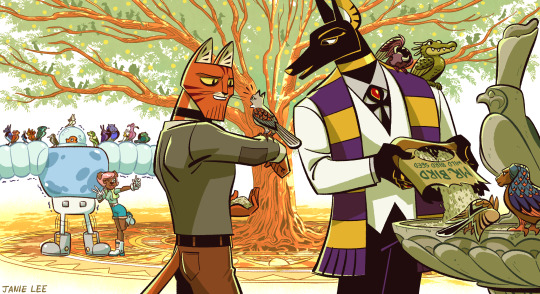
The Ancient Egyptians believed the soul had three parts, the Ka, the Ba, and the Akh. The Ba was essentially a person’s double, a life force, and at death it was separated from the body. I thought it would be cool if the Ba birds were dead members of the EN9 (Khenti's archeology agency) who work as messenger birds or eyes from the skies! 🐦
LINKTREE
2K notes
·
View notes
Text
meeting starters ( always accepting ) | @virtueofsanityx sent 🚚 — to move in next to my muse.

the townhouse next to khenti's never keeps an occupant long. the realtor has a litany of excuses for this despite the truth, which is that it's haunted, and khenti would warn buyers if he could — but, alas, that same realtor has quite literally chased him off the lawn with a newspaper on more than one occasion. he's taller than she is but stronger? honestly debatable, and he isn't particularly interested in invoking the ire of a 54 year old woman that comes up to his waist. she might bite his ankles or something. scary.
... but, now that there's someone decidedly new looking in the mailbox who has already moved in, he can't help himself from approaching. he does so in an accidentally ( probably ) startling way, near-silently approaching from behind and waiting patiently for them to turn around before speaking up. "your house is very haunted," he says, expression as flat as his voice is. a glance is spared to the townhouse and he makes eye contact with a spirit staring back at him in the window. instead of holding his new neighbor's gaze, khenti holds theirs. "i hope they didn't overcharge." this is his nice way of saying it's also a piece of shit house. this is a piece of shit neighborhood and you have poltergeists.
#ok i kinda went backwards and it's y/m moving in next to him but i just finished it when i noticed#; * khenti: thread.#virtueofsanityx
1 note
·
View note
Text

it takes june a beat too long to realize that he's bracing for a moment that will never come. there's no empty platitudes full of artificial sympathy or condescending gaze ( the kind that makes junsung feel small and pathetic, like a kicked dog ), it's just khenti. his expression unmoving, no condolences offered. instead he offers an answer. something unlocks in his chest, a feeling he doesn't immediately recognize. it's somewhere between relief and astonishment. maybe a little bit of adoration. it's there but fleeting, rising up for a moment before being overtaken by the memory of why he's here in the first place. of what he's asking for.
immediately his free hand reaches up to grab at the necklace that never leaves his body, only to come up empty. of course. of course it's not here, it's sitting in the morgue or some fucking evidence locker. his dads wedding ring was the only thing recovered from the car accident, a little bent but somehow otherwise unmarred. it'd been fashioned on a nice silver chain since he was thirteen, kept safe against his skin. until now. frustration and longing intertwine in the pit of his stomach. " i don't- i don't have anything, not with me. it's not here. "
june becomes acutely aware of how long they've been holding hands when the pad of khenti's thumb makes another pass against his skin. he knows he should probably let go, but he can't quite bring himself to detach. not yet. maybe if he could just get through this part. his parents were here. probably. he just didn't have the slightest idea where. maybe his childhood home, the one he now owned ( that sits empty most of the time ). but is that where they lived the longest? he tries to think, shuffling back in his memories. before america there was korea. how long had they lived in that apartment? he sighs, fighting the urge to scrub at his face with his hands." i bought their house a couple of years ago, maybe there. " it was hard not to catastrophize, to assume the worst. optimism wasn't something he was well versed in, but khenti was offering him a chance. and he'd been dealing with ghosts a lot longer than june had, so maybe he should trust him. " i have some stuff in storage, too. mostly clothes. will it be enough? i don't know how this works, i never watched stranger things. i thought it was a kids show. "

" don't apologize. you didn't ask to feel any more than you asked to die. just like i didn't ask to feel it, too. you just do. and i just do, too. " what khenti doesn't say is that he gets why he's sorry, gets why he's saying it. it's a terrible burden, the heart is, and to be seen and felt by someone in such a distinct and intimate way must be alarming. he's often thought that if anyone had access to his emotions the way he does to spirits, it'd upset him; so, he sympathizes, but he still doesn't want him to feel guilt for something neither of them can control. similarly, he doesn't really feel guilt for the innate invasion of his ability, either. maybe that's wrong of him. at this point, what he can do is just a matter of facts that he's accepted.
he's patient for the in-between.
shoulder against the hardwood of the door, he looks back at junsung who stares at him, and he doesn't maintain eye contact the entire time but he doesn't shy away from it either. ( he's never really known what the appropriate level is. ) his eyes wander, clinging to junsung's fists as they clench and ball up. upset, definitely upset. he's not surprised to learn his guess was correct, that he'd been expecting to meet up with someone after death. now he's sensing anger of a sort, one that he chalks down to something he suspects junsung has felt for a long time — they must've passed some time ago, they must've left behind some rage. khenti's expression remains the same as it has since they first came face to face. it's difficult to evoke a different one from him, no matter how upsetting a story it is; no matter the sympathy he does feel for the boy who's lost his parents and had only hoped to reunite with them. like the emotions that he can't help but feel, human suffering is just a fact. it will never surprise him, it will never astonish him, and it's all he can do to simply answer the guy's questions here. that'd be the most helpful thing. he's not meant to give flowers, condolences. he's meant to help.
"probably," he says after a beat or two, eyebrows raised, shoulders too. they fall again with a slump, head tilting to lean against the doorframe. his eyes have wandered now as he speaks, his voice even. "i mean, they're around. it's just a matter of narrowing down where. my guess would be wherever you lived the longest, or wherever they liked to be the most. depending how long ago they died, they may've roamed. usually, they pick somewhere eventually." a long arm is lifted, his index finger pointing to west. "he's been dead for 30 years. he just follows me around, just because." there's another noise from west, but it's really just... garbled talking. khenti blinks in his direction. his arm drops hard against his side and he keeps his eyes on the specter on the couch. "if you can give me some personal artifacts of theirs, we might be able to summon them, too. or open a path of communication. i have some level of telepathic ability. it's kind of like eleven from stranger things." eyes dart back to junsung, expression still flat. "a lot like that, actually. have you got anything of theirs?"
he hasn't let go of his hand. he hasn't stopped rubbing circles into the top of it. he hopes it's helping.
8 notes
·
View notes
Text
Working With Anubis

Lord Of The Scales
Other names: Yinepu, Khenty-Amentiu, Anpu
Other titles: Judge of Hearts, the Jackal-Headed God, the Embalmer, Deputy of Ra, Great Child of the West, God of the Dead
Colors: Black, dark blue, gold, silver
Herbs: Cypress, poppy, rose, hyacinth, frankincense, myrrh, anise, rosemary, clovee, cardamom, benzoin, juniper, mugwort, bay, bergamot, cedar, forget me not, aloe, mullien, marshmallow, turmeric, cinnamon, saffron
Crystals: Lapis lazuli, larvakite, indigo gabbro, labradorite, obsidian, fire opal, hematite, onyx, blue goldstone, black tourmaline, black jade, smokey/black quartz, black amethyst, Libyan desert glass, citrine, prophecy stone, cerusite
Element: Earth
Planet: The Moon, Saturn, Pluto
Zodiac: Scorpio, Capricorn
Metal: Gold, silver
Tarot: Death, Judgment, the Moon
Day: Friday, Saturday
Direction: West
Domains: Life, death and rebirth, afterlife, funerary practices, tarot, divination, necromancy/death work, mediumship, manifestation, good fortune and prosperity, balance, duality, shadow work, inner growth/healing, emotion or "the heart", truth, ancient wisdom
Offerings: Cool water, dark chocolate, black coffee, bones, rum, whiskey, mead, wine, incense, ankhs, jackal/dog themed items/figures, gold objects, coins, paying respects to the dead
Symbols:



#satanic witch#magick#witch#lefthandpath#dark#demons#witchcraft#egyptian gods#ancient egypt#egyptian#God#spirit work#eclectic witch#eclectic pagan#eclectic#chaos witch#god anubis#Anubis#witchblr#witch community
74 notes
·
View notes
Text




Horus 𓄿 Talon Abraxas
Horus (Also Heru-sa-Aset, Hrw, Hr, and Hor-Hekenu) is the falcon-headed god of ancient Egyptian mythology.
Like many other gods the nature of what he was and the legends and stories that went with him changed over the course of history. Horus was an amalgamation of other, related deities, all of whom were sun gods and associated with the royal prerogative and the sky. Because Horus was a combination of other gods, it is rarely correct to refer to "Horus" as Horus was as much a family of related deities (though many had differing parentages) unified in one being; something similar occurs in many Christians' interpretation of the one God who manifests in three parts.
Heru-ur (also called Harmerti) is the oldest version of Horus, and was a falcon creator-god who was known for restraining Apep. His eyes were the sun and the moon; during a new moon, he was blind and was called Mekhenty-er-irty ("he who has no eyes") and upon the return of his sight, he was called Khenty-irty ("he who has eyes"). While blind, Horus was quite dangerous, sometimes attacking his friends after mistaking them for enemies. He was a son of Geb and Nut and was the patron god of Letopolis.
As a child, Horus was called Har-pa-khered ("Horus the child" and called Harpocrates by the Greeks) and was a son of either Osiris and Isis or Banebdjetet and Hatmehit. He was depicted as a naked boy with a finger in his mouth, sitting on a lotus with his mother. In this form, he was a fertility god and was depicted with a cornucopia. Har-pa-Khered became very popular during the time of the Roman Empire, when he was depicted riding a goose or ram (note Banebdjetet, his father, was a ram god).
Later Horus became absolutely aligned as a son of the dead body of Osiris and Isis (alternatively: he emerged from Saosis' acacia tree). This is very often cited as "the" Horus in many scholarly works. In truth, this Horus was called Har-sa-iset or Harsiesis.
As Har-nedj-itef (Harendotes in Greek), Horus was Osiris' bodyguard in the underworld, called the Duat.
As Behedti, Horus was the patron deity of Behdet (cur: Edfu), where he was strongly associated with the falcon.
As Chenti-irti, Horus was a falcon-god of law and order.
Later still he became associated with the sun god Ra where they combined especially at Heliopolis and became Ra-Herekhty (also Ra-Heru-akhety, Her-akhety ("Horus of the two horizons"), Har-em-akhet ("Horus upon the horizon"), Horakhety, Harmachis (Greek)), god of the morning sun.
Anhur was Horus as a union with Shu.
In the 3rd millennium BC, Set became the patron god of the pharaohs (replacing Horus in the form of Har-mau or Harsomtus) after overthrowing Horus in the form of Har-wer or Haroeris. Later a story became popular that Set had killed Horus' father Osiris, and Set was thought of more and more as an evil god. So Har-mau was again made the pharaohs' patron in this myth: A war between Set and Horus ensued, lasting for eighty years. Har-mau tore off one leg and the testicles of Set, who in turn took out Har-mau's left eye (hence he is referred to as "the one-eyed god"). His eye was later returned to him. Horus won the war (with the support of Neith) and became the ruler of Lower and Upper Egypt. Seth was castrated or killed or moved in with Ra and became the voice of thunder.
Horus was the father of the four gods associated with the canopic jars of Egyptian funerary beliefs: Imset, Hapi, Duamutef, and Kebechsenef.
50 notes
·
View notes
Text
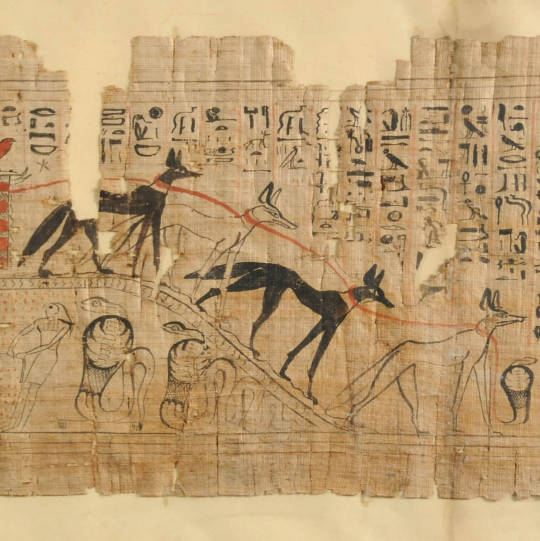
Funerary papyrus of the scribe Djehutymes
Third Intermediate Period, 21st Dynasty, ca. 1069-945 BC. Now in the Egyptian Museum of Turin. Cat. 1781
In ancient Egypt, jackals and dogs were very common in the land between desert and urban areas, so they were associated with the world of necropolis and the dead. Specifically, their wandering among the tombs was interpreted as a perpetual guard service to the deceased.
The black jackal lent its features to different gods: Anubis, Wepwawet, Khenti-Amentiu and others, but there was a particular category of jackals in the divine sphere that were known as sTAw: they were the canids that pulled the solar boat during the night.
Read more
171 notes
·
View notes
Text
Dua Yinepu, Khenty-Amentiu 🙏
Praise Anubis, Foremost of the Westerners
⚰️⚱️
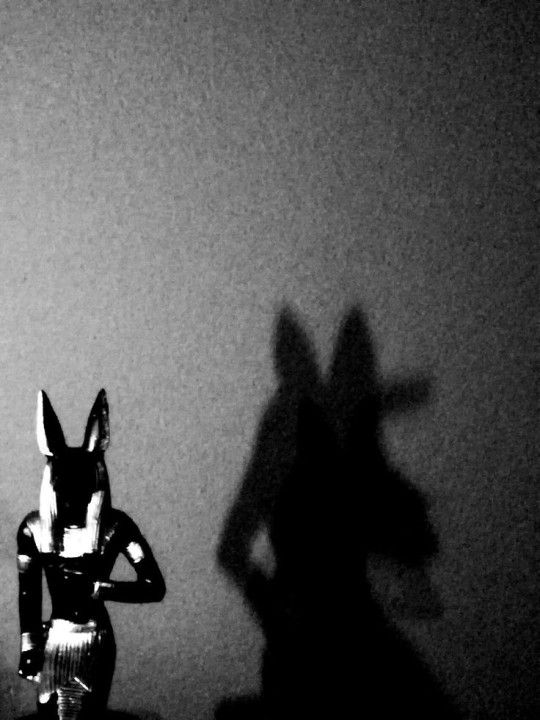
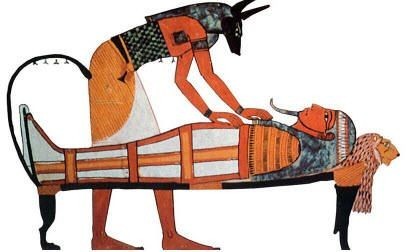




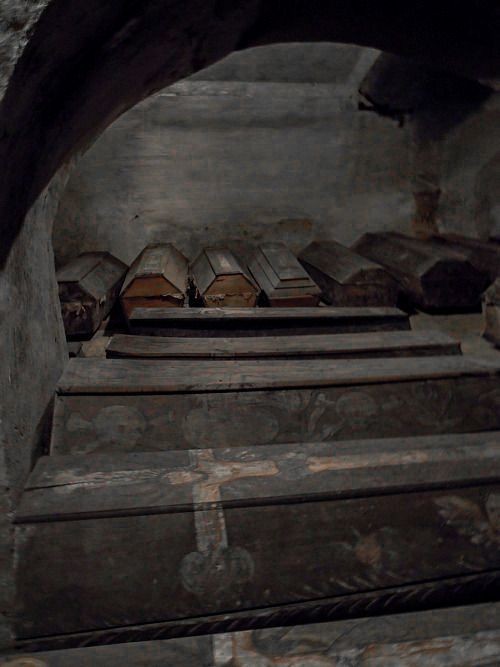
Praise He Who Is upon His Mountain
Praise The Lord of the Sacred
Praise He Who Is in the Place of Embalming
#yinepu#anpu#egypt#ennead#ancient egypt#egyptian mythology#kemet#ancient kemet#funerary#anubis#egyptian#dua#em hotep#netjeru#netjer#maat#dua netjer#deity worship#kemetic#kemeticism#kemetism#kemetic paganism#kemetic polytheism
126 notes
·
View notes
Text





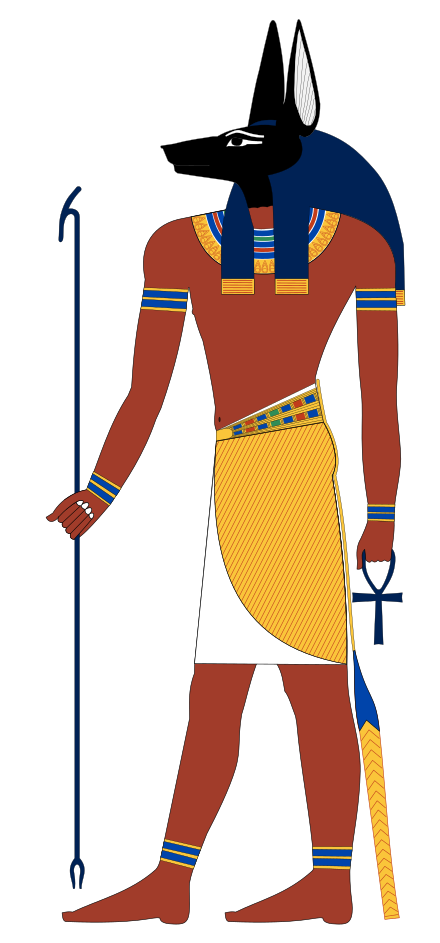
Anpu/Anubis
Other names:Ἄνουβις, Inpu, Inpw, Jnpw, Anpu, ⲁⲛⲟⲩⲡ
Major cult center:Lycopolis, Cynopolis
Domain:Judgment Halls of Duat
Symbol:mummy gauze, jackal, flail, nwA or nwt blade tool, Seated dog, Wadjet eye, Sekhem scepter, imy-wt a fetish of leopard skin hung from a pole often made of wood and set before the kings throne
Parents:Nepthys and Set, Osiris (Middle and New kingdom) or Ra (Old kingdom). His fourth son
Alternative parentage:Ra and Hesat (early manifestation of hathor), Set and Nephytys, Nephytys and Ra, Bastet
Siblings:Wepwawet, Horus (step brother when osiris and isis are parents), Anput sister (when parents are Set and Nephytys, Bata (in the tale of the two brothers)
Consort:Anput, Nephthys
Offspring:Kebechet, Wapwawet (sometimes) son, Ammut (sometimes) daughter
Greek equivalent:Hades or Hermes
Roles:Master embalmer, Inventor of embalming, Cheif physician, Watcher, Guardian of the dead, Phychopomp 'guide of souls', Master of the scales in the Hall of Amunety, Naturr god of twilight and dawn, Tribunal of Wesir, Sirius star, Personification of the summer solstice
Hybrid gods:Hermanubis/hermes anubis
Connection to other gods:Hermes (roman), Cerberus (parents echidna and typhon), Garmr or Garm (norsr) rag (old norse), Nibhaz (hebrew)
Anubis is the god of death(psychopomp), mummification, embalming, the afterlife, cemeteries, tombs, and the Underworld, in ancient Egyptian religion, usually depicted as a canine or a man with a canine head.
Like many ancient Egyptian deities, Anubis assumed different roles in various contexts. Depicted as a protector of graves as early as the First Dynasty (c. 3100 – c. 2890 BC), Anubis was also an embalmer. By the Middle Kingdom (c. 2055–1650 BC) he was replaced by Osiris in his role as lord of the underworld. One of his prominent roles was as a god who ushered souls into the afterlife. He attended the weighing scale during the "Weighing of the Heart", in which it was determined whether a soul would be allowed to enter the realm of the dead. Anubis is one of the most frequently depicted and mentioned gods in the Egyptian pantheon, however, no relevant myth involved him.
Anubis was depicted in black, a color that symbolized regeneration, life, the soil of the Nile River, and the discoloration of the corpse after embalming. Anubis is associated with his brother Wepwawet, another Egyptian god portrayed with a dog's head or in canine form, but with grey or white fur. Historians assume that the two figures were eventually combined. Anubis' female counterpart is Anput. His daughter is the serpent goddess Kebechet.
Roles
Embalmer
As jmy-wt (Imiut or the Imiut fetish) "He who is in the place of embalming", Anubis was associated with mummification. He was also called ḫnty zḥ-nṯr "He who presides over the god's booth", in which "booth" could refer either to the place where embalming was carried out or the pharaoh's burial chamber.
In the Osiris myth, Anubis helped Isis to embalm Osiris. Indeed, when the Osiris myth emerged, it was said that after Osiris had been killed by Set, Osiris's organs were given to Anubis as a gift. With this connection, Anubis became the patron god of embalmers; during the rites of mummification, illustrations from the Book of the Dead often show a wolf-mask-wearing priest supporting the upright mummy.
Protector of tombs
Anubis was a protector of graves and cemeteries. Several epithets attached to his name in Egyptian texts and inscriptions referred to that role. Khenty-Amentiu, which means "foremost of the westerners" and was also the name of a different canine funerary god, alluded to his protecting function because the dead were usually buried on the west bank of the Nile.He took other names in connection with his funerary role, such as tpy-ḏw.f (Tepy-djuef) "He who is upon his mountain" (i.e. keeping guard over tombs from above) and nb-t3-ḏsr (Neb-ta-djeser) "Lord of the sacred land", which designates him as a god of the desert necropolis.
The Jumilhac papyrus recounts another tale where Anubis protected the body of Osiris from Set. Set attempted to attack the body of Osiris by transforming himself into a leopard. Anubis stopped and subdued Set, however, and he branded Set's skin with a hot iron rod. Anubis then flayed Set and wore his skin as a warning against bad people who would desecrate the tombs of the dead.Priests who attended to the dead wore leopard skin in order to commemorate Anubis' victory over Set. The legend of Anubis branding the hide of Set in leopard form was used to explain how the leopard got its spots.
Most ancient tombs had prayers to Anubis carved on them.
Weigher of Hearts
One of the roles of Anubis was as the "Guardian of the Scales."The critical scene depicting the weighing of the heart, in the Book of the Dead, shows Anubis performing a measurement that determined whether the person was worthy of entering the realm of the dead (the underworld, known as Duat). By weighing the heart of a deceased person against Ma'at (or "truth"), who was often represented as an ostrich feather, Anubis dictated the fate of souls. Souls heavier than a feather would be devoured by Ammit, and souls lighter than a feather would ascend to a heavenly existence.

Anput
Symbols:jackal, canopic jars, mummy gauze
Consort:Anubis
Offspring:Kebechet
Anput is a goddess in ancient Egyptian religion. Her name is written in hieroglyphs as jnpwt (reconstructed in Middle Egyptian as /ʔan.ˈpa.wat/ or /jan.ˈpa.wat/).In English, her name also is rendered as Anupet, Input, Inpewt, and Yineput. As the female counterpart of her husband, Anubis, who was known as jnpw to the Egyptians, Anput's name ends in a feminine "t" suffix when seen as jnpwt.
Draconian
Draconian-Egyptian Grimoire-Asenath Mason
Anpu, also known as Anubis in Greek, was the original Egyptian Lord of the Dead before the death of Asar (Osiris) that occurred with the rise of the Asar cult. As the stories go, Anpu vacated the spot as a sign of respect for Asar, and became the lord of the embalming process, funerals, graveyards, the weighing of the soul in the hall of Amenti, and ferrying the souls into the land of the dead. Highly shamanic, Anpu is a guide that can help us find the correct path when we seek his wisdom. Different myths have different lineages associated with them, but the oldest myths say he is a son of Ra. However, through the centuries his lineage changed several times, and drastically at that, as did his role as can be seen above. In his book "777," Aleister Crowley corresponds him to Hod on the Qabalistic tree of life, which is also where Mercury and Ilermes are placed, due to their psychopomp natures. However, since that was a later addition to the legend of Anpu, there would be a different Qabalistic correspondence for him that would correspond to our work. We will be working with him to guide us to deeper into the draconian mysteries of ancient Egypt that time has forgotten. We should also remember that the role of psychopomp attached to Anpu rose during the early Hermetic era, and didn't reflect earlier Egyptian periods and teachings.
──────⊰In Workings⊱──────
*Please know basic protections and energy work before attempting any deity work.*
*It is important to note that everyone's experiences are different and will work with spirits for different reasons. Some people may like a spirit while others will not and that's okay. Ask these spirits what they will work with you on as well as ask them if they can help you with whatever it is you need.*
Anubis had male priests who sported wood masks with the god's likeness when performing rituals. His cult center was at Cynopolis in Upper Egypt but memorials were built everywhere and he was universally revered in every part of the nation
Ideas for honoring and working with/worshiping Anpu/Anubis
Anubis being a psychopomp deity he can ensure dead loved ones safety in the afterlife. He can also protect the practitioner from harm. He may also be good help in necromancy.
Altar
Create an altar/sacred space for performing rituals and giving offerings to Anpu/Anubis.
⬩An altar cloth
⬩Black and gold candles(you can use any color)
⬩Incense and an incense burner
⬩Offering bowl
⬩Statue of him or jackal
For more information on basic altar setups and deity work check out the deity work post.
Offerings:Antique keys, Bandages, Black coffee, Bones, Cinnamon , Feather, Frankincense, Hermatite, Phantom quartz, Puzzle boxes, Mastic/arabic gum/yemen gum (used in food and embalming), Myrrh, Pumpkin spice, Scales, Skulls, Smokey quarts, Vanilla,
Rituals
Ideas for rituals may include
For any ritual you are doing for Anubis you can wear a mask in his likeness. Ideas for rituals may include calling him for
⬩Protection
⬩Helping the dead cross over
⬩Honoring the dead
⬩Honoring the life you have
⬩Funerary rites
⬩Necromancy
⬩you can ask him what he will work with you on⬩
Evocation to Anpu/Anubis(made by me)(credit my Tumblr if used)
Anpu/Anput, Protector of the dead.
Guide of souls, I call to you
Find no wickedness in me, I shall bring you truth
I ask for your protection, I ask for your guidance
Overseer of the dead, I ask your alliance
Please accept my offering, Dua Anpu
𓃣𓃦𓃢𓃥𓃥𓃥𓃥𓃥𓃥𓃥𓃥𓃥𓃥𓃥𓃢

For more content relating to other practices/religions or pantheons follow my main blog for updates.
If you have any more questions or wish to join a community feel free to join my 18+ discord server
Ask me anything on my blog
#Anpu#anpu#Anput#Anubis#Kemetism#occult#witchcraft#deity#witchblr#spirits#spirit#spirit work#spirituality#deity work#deity worship#Occultblr#occultblr#kemeticism#neterism#netjeru#neteru#kemetic#kemetic witch#kemetic pagan#kemetic paganism#pagan#pagan witch#paganism#occultism#kemetic polytheism
79 notes
·
View notes
Text
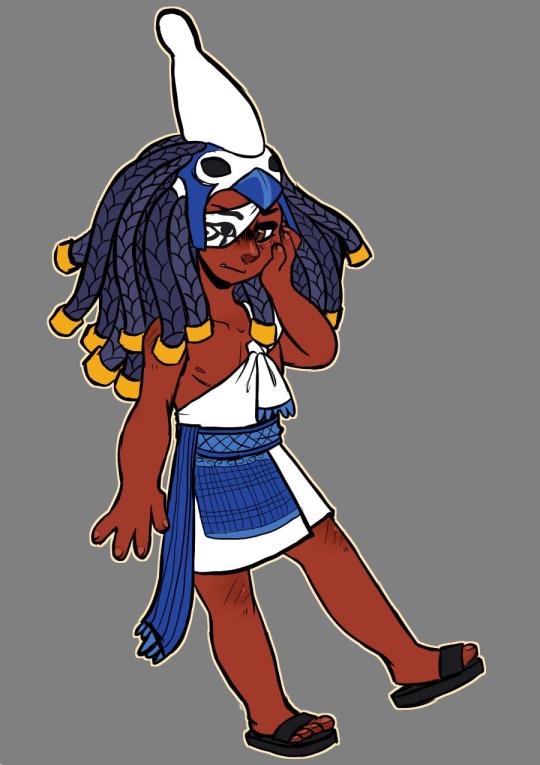

Hor the Elder and Setesh the Elder
Pre-Dynastic deity brothers who fuckin’ hate each other but live together in a Libyan oasis temple anyway, because obviously that’s how you solve your familial problems. Exposure. Or whatever.
In the timeline of Pantheon, their story begins in the pre-dynastic period prior to the unification of Kemet. Hor and Setesh, both royal princes who rule in Nekhen and Naqada respectively, got along fine with each other (aside from general sibling rivalry) until the abrupt death of their father, Andjety, the god of kingship, who drowned in the Nile. His body was not recovered.
Shit hit the fan.
See, there were two problems: first, the brothers encountered their first experience with true death. Not the kind where you go take a visit to the underworld and reunite your ba with your ka, but True Oblivion that comes from dying and leaving behind an unrecoverable body. Without the body preserved, there can be no resurrection.
The second issue? Andjety also didn’t leave a will for his kingdom. Lack of writing systems and all back in those days. So Hor and Setesh, shattered by the loss of their father, both sank into their grief, and both felt obligated to step into their father’s sandals and become the new king.
This resulted in constant warfare between the two Upper Egyptian city-states as their patron gods struggled to handle their loss. In the process, they crushed the kingdom of Abdju between them, sending its gods—Khenti-Amentiu, Anpu, Wepwawet, and Wepiu—fleeing north, where they allied with the Delta gods: Ptah, Sokar, Kherty, and Neith.
Hor and Setesh set aside their differences and united against the common threat. The two, reconciled, steamrolled the Delta resistance. Khenti-Amentiu and sons fled to the underworld through Saqqara, displacing Sokar and Kherty’s family in an attempt to avoid getting killed by the enraged brothers.
But after their victory, Hor turned against Setesh and banished him to a Libyan oasis. He wanted to be the one and only king, and even the mortal kings loved and took on his name. Sure, Peribsen tried recalling Setesh, but Hor chased him away again.
Which worked great, until a new threat arrived. He called himself Ra, and Hor was no match for him. He begged Setesh to help. Setesh told him to go fuck himself. Ra took over the lands by the 3rd Dynasty and banished Hor to Libya as well, laying the foundation for his ironclad rule.
The age of the sun had arrived.
Commissioned work, illustrated by Eaglidots
#bronzegods#bronze gods#pantheon#kemet pantheon#egyptian mythology#the two brothers#hor#setesh#predynastic egypt#ra#ptah#sokar#kherty#khentiamentiu#wepwawet#wepiu#andjety#neith#lore#egyptian-mythology#iconography
12 notes
·
View notes
Text
Isis and Osiris and its Ancient Origins

By English School/ Unidentified painter - http://www.historicalportraits.com/Gallery.asp?Page=Item&ItemID=695&Desc=Edmund-Spenser-%7C--English-School, Public Domain, https://commons.wikimedia.org/w/index.php?curid=16569312
Edmund Spencer was an English poet who lived from about 1552-1599. He was born in London, England and attended Pembroke College, Cambridge as a sizar, one who receives some type of aid. He married around 1579 to Machabyas Childe and had two children. In 1580, he went to Ireland under the Lord Deputy Arther Grey, 14th Baron Grey de Wilton. with Walter Raleigh and was at the Siege of Smerwick. He remained when Lord Grey was called back to England. He later had an estate in North Cork. There was a tree near there that had been called 'Spenser's Oak' that was destroyed by lightning in the 1960s. The legend about the treat is that he wrote some of The Faerie Queene under it. In 1590, he returned to London to publish the first three books of the Faerie Queene, for which he was awarded a pension of £50 per year from Queen Elizabeth I. He hoped to secure a place at court, but the inclusion of Mother Hubberd's Tale offended William Cecil, Lord Burghley, who was the queen's principal secretary, so he returned to Ireland where he was the center of a literary circle. By 1594, his wife died and he remarried a 'much younger' Elizabeth Boyle, which inspired several works. During the Nine Years' War, which was from 15593-1603 in Ireland, Spencer was forced from his home in 1598. He traveled to London in 1599 where he died 'for want of bread', according to Ben Jonson, though this is doubtful because of Spenser's pension. He was buried near Geoffrey Chaucer in Westminster Abbey.


The Faerie Queene is an epic poem that is over 36,000 lines, 4,000 stanzas, and was published in 6 books. The poem explores themes of religion, virtue, politics, and explores myth and history in an over arching story that could be read literally or for the metaphorical. Each of the six books is focused around a particular virtue: Holiness, Temperance, Chastity, Trust, Justice, and Courtesy.

By Jeff Dahl - Own work, CC BY-SA 4.0, https://commons.wikimedia.org/w/index.php?curid=3248602
Osiris was an ancient Egyptian god who was first mentioned in the Fifth Dynasty (between about 2494-2345 BCE) and was appeared in the Pyramid Texts. Given this, he was likely worshiped before then given that one of his epithets, Khenti-Amentiu, 'Foremost of the Westerners', appeared in the First Kingdom. Ancient Egyptians associated the West with death since that was the direction that the sun set. During their lives, pharaohs were associated with Ra, the sun god, during their lives and with Osiris after death. Within the Pyramid Texts is the story of Set conning Osiris into a box that is then sealed with lead. Set threw the box into the Nile. Later, Isis found the box in a tamarisk tree in Byblos, Lebanon. Isis was able to remove the box from the tree, though Osiris was dead. She was able to briefly revive him, long enough to conceive a child. After that, Osiris was the god of the underworld, death, and resurrection. In the Greco-Roman era, he was folded into the god Serapis, who was the consort of Isis, though there was a cultic center in Philae that continued until at least 450 CE.

By Jeff Dahl - Own work, CC BY-SA 4.0, https://commons.wikimedia.org/w/index.php?curid=3252750
Isis was the ancient Egyptian goddess who was first named in the Fifth Dynasty and appears in the Pyramid Texts but was likely worshiped before then. Within the Pyramid Texts, she was an active participant in the drama between Set and Osiris, lending her a more complex character than other goddesses. Within the texts, she expressed sorrow, anger, and sexual desire after the death of Osiris at the hands of Set. She used these emotions to aid in the revival of Osiris and they allowed the conception of Horus and guarantee Osiris an afterlife. She aided dead souls in returning themselves to wholeness, as she did with Osiris. She was seen as the goddess of protection over the pharaohs, as the wife and mother of them; the goddess of wisdom and magic, seen as 'more clever than a million gods' because of her ability to revive and protect Osiris and Horus; goddess of the 'Nile in the sky', as rain was called, and the 'Lady of Heaven'; and a universal goddess, one who held power over the sky, earth, and Duat, the afterlife. Her worship continued into the Greco-Roman world, reaching Rome probably in the second century BCE, reaching a peak in the late second and early third century CE.

In Book V, Canto VII, there is a section dedicated to Isis and Osyris (as Osiris is spelled in the poem), describing him as 'of the race/Of th' old Ægyptian kings that whylome [formerly] were;/With fayned [glad] colours shading a true case/For that Osyris, whilest he lived here,/The justest man alive and truest did appear.' The next stanza continues, describing '[h]is wife was Isis; whom they likewise made/A goddesse of great powre and soverinty,/And in her person cunningly did shade/That part of justice which is Equity'. With the gods, there was 'a crocodile was rold [rolled],/That with her wreathed taile her middle did enfold.' Isis is shown with '[o]ne foote was set uppon the crocodile,/And on the ground the other fast did stand;/So meaning to suppresse both forged guile/And open force: and in her other hand/She stretch forth a long white sclender [slender] wand.' The focus is likely more on Isis than Osiris because of Spencer's focus on writing something for Queen Elizabeth I as well as following the journey of a female knight, Britomart.
You can read the referenced part of the poem here. You can read the entire poem here. You can listen to the poem here.
2 notes
·
View notes
Text

Matterhorn at Khenti’s. West end, 2024
4 notes
·
View notes
Text

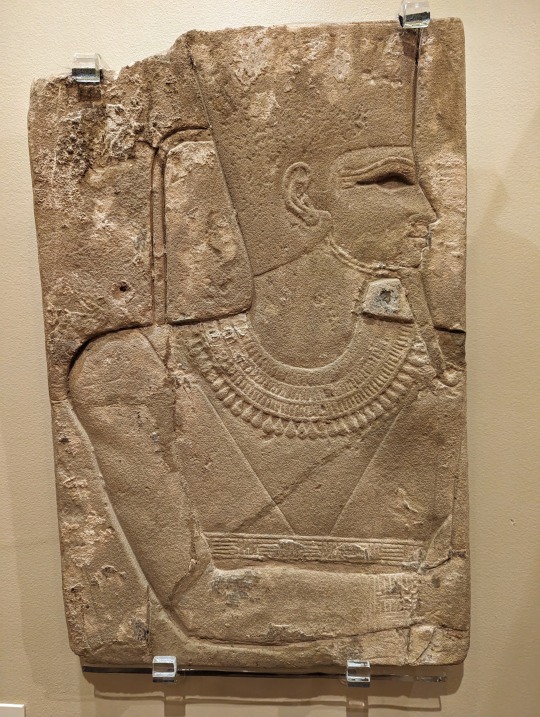


Collection of ancient Egyptian artifacts. The hieroglyphs on the case translate to:
An offering in which the King gives to Osiris Khenty-Amenty, the Great God, Lord of Busiris, Lord of Abydos.
That he may give a goodly burial in the Necropolis of the desert, for the . . . of the Hathorian Sedem.
May she be given beer, oxen . . . oferings and provisions, and all things.
Pure for the Ka of Hathorian Sedem.
Falcon - Polychrome Wood (600-500 BCE)
The God Amun-Ra - Limestone (1080- 656 BCE)
Mummy Case - Polychrome and gilded gesso over sycamore or cedar wood (300 BCE)
Wall Relief - Limestone (1570-1320- BCE)
#archaeology#ancient egypt#egyptology#museums#history#science#not my usual dinosaur stuff but still cool enough for me to share
13 notes
·
View notes
Text
closed starter for @myplutoisms.

" ... are you going to buy something? " khenti gets it. the divide is an interesting shop with plenty to look at, from spiritual guidance books to pendulums to tarot decks, but this guy has an energy that is so off-putting; and that's coming from him. he's the only employee in today, as is usually the case, and the two of them keep making short lived eye contact. if he didn't know better, he'd say he wasn't here for any books, but it's hard to tell when someone is seeking his expertise in his side business. he doesn't exactly advertise that he can deal with spirits — largely for safety reasons — so much as word of mouth does that for him, often bringing cases to his doorstep. sat behind the counter with his leg tucked under himself, he raises his eyebrows at the person browsing, swallows hard.
1 note
·
View note
Text


scarlett kissy animation 💋♡
. . .
i need to start sketching my ideas for our story, but i’ve been focusing more on just writing our ideas down and getting the plot straight ( ; ; )i dont wanna get too burnt out by this, and may try to work on other art/characters, and maybe some smaller stories for them! i love khenti and scarlett so much, but i draw them CONSTANTLY 😭 i do have a lot of ocs that don’t get much attention, most of them i made on a whim LOL so i think ill spend more time working on them <3
(also, procreate gifs are kinda ass, and i had to compress for tumblr 🙄)
#original character#oc#oc art#character art#character illustration#character design#animation#character animation#digital art#digital illustration#artists on tumblr#digital artist#my ocs
5 notes
·
View notes
Photo

Love Enre-hep’s face in the background of Khenti’s art.
14 notes
·
View notes
Note
If you get this, answer with 3 random facts about yourself and send this to the last 7 people in your notifs! Let’s get to know each other better! (Anon or not, it doesn’t matter)
1. I’m one of the major editors for the Deshret Script - Texts section in the Genshin Wiki. I decoded (with help from some extremely clever translators on Reddit and Twitter, not gonna claim I did this alone) the Eremite weapon inscriptions and etymology, the Obelisk text, and Cyno’s namecard, among others. My favourite was decoding the text on Deshret’s tomb, “AMON-KHENTI-AMENTI // MEKDSRT-WAFKHASUT”.
2. I am a shuake lover, but less well-known is that I am a suzalulu (god I hate that ship name) lover as well. Code Geass is one of my favourite anime of all time and I highly recommend it to literally anyone. If I had a coin for every time a black-haired antihero is rivals with a brown-haired do-gooder who is secretly also unethical/morally dubious I would have two coins, which is strange that it happened twice.
3. Yes I am a Haruki Murakami enjoyer. Have read Kafka on the Shore, Colourless Tsukuru Tazaki, Norwegian Wood, South of the Border West of the Sun, and Men without Women. All were wonderful in their own ways and I will throw hands in Murakami book discourse. Fight me.
2 notes
·
View notes